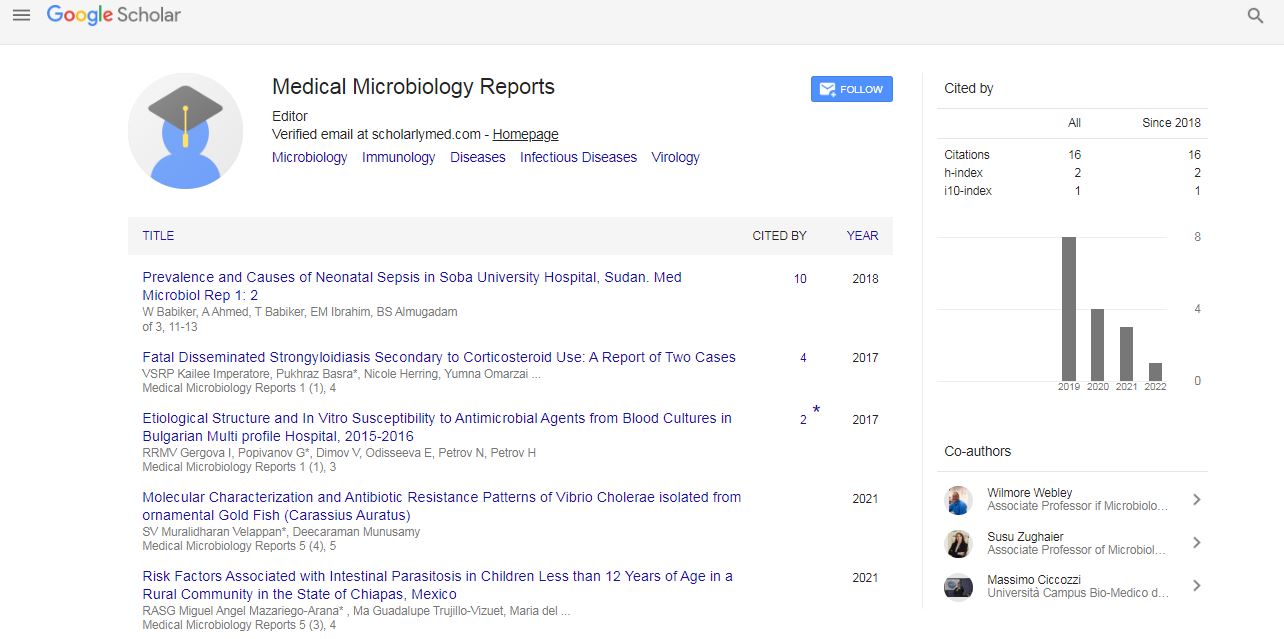Short Communication, Med Microbiol Rep Vol: 5 Issue: 1
Quality of Life and Marital adjustment in spouses of schizophrenia patients
Samiksha Sahu, Suprakash Chaudhury and Daniel Saldanha
Dr D Y Patil Medical College, Hospital & Research Centre, Pimpri, Pune, India
Abstract
Schizophrenia is a chronic disabling; psychiatric disorder that affects around 1% of the population and its point prevalence is 0.6 to 8.3 cases per 1000 population. 1,2Caregiving in psychiatric illness is an exhausting and challenging activity that typically involves a considerable amount of energy, time and money over considerably long periods of time, in tasks that may be unpleasant or uncomfortable and could be psychologically and physically stressful and tiring.3
Caregiving to mentally unstable people can be particularly challenging in traditional societies such as India. The close - knit family structure and lack of adequate government resources to support people with mental illness place the burden of care on the family which is perceived to be the ‘‘natural’’ caregiver. Socio-cultural expectations envision caregiving as an obligation and moral binding which is to be given by parents, children or the spouse. Religious-cultural attributions often causally implicate supernatural factors in the manifestation of mental illness.
Schizophrenia is a severe mental disorder that usually starts in late adolescence or early adulthood, and is characterized by profound disruption in thinking, language, perception and the sense of self, and includes psychotic experiences, such as hearing voices or delusions. 6
The volatile nature of the disorder and its accompanying debilitating consequences burdens the family in multiple domains causing social, emotional and financial problems. Several studies had done worldwide reveal a high level of burden, social isolation and stigma among caregivers of schizophrenia. Indian data in this area is relatively sparse however some studies reports the presence of depression, anxiety, poor mental and physical health and other mental disorders among the caregivers. In view of the above the present study was undertaken to evaluate the quality of life and marital adjustment in spouses of schizophrenia patients.
Keywords: Bacteriology, Virology, Microbiology, Immunotherapies
Abstract
Schizophrenia is a chronic disabling; psychiatric disorder that affects around 1% of the population and its point prevalence is 0.6 to 8.3 cases per 1000 population. 1,2Caregiving in psychiatric illness is an exhausting and challenging activity that typically involves a considerable amount of energy, time and money over considerably long periods of time, in tasks that may be unpleasant or uncomfortable and could be psychologically and physically stressful and tiring.3
Caregiving to mentally unstable people can be particularly challenging in traditional societies such as India. The close - knit family structure and lack of adequate government resources to support people with mental illness place the burden of care on the family which is perceived to be the ‘‘natural’’ caregiver. Socio-cultural expectations envision caregiving as an obligation and moral binding which is to be given by parents, children or the spouse. Religious-cultural attributions often causally implicate supernatural factors in the manifestation of mental illness.
Schizophrenia is a severe mental disorder that usually starts in late adolescence or early adulthood, and is characterized by profound disruption in thinking, language, perception and the sense of self, and includes psychotic experiences, such as hearing voices or delusions. 6
The volatile nature of the disorder and its accompanying debilitating consequences burdens the family in multiple domains causing social, emotional and financial problems. Several studies had done worldwide reveal a high level of burden, social isolation and stigma among caregivers of schizophrenia. Indian data in this area is relatively sparse however some studies reports the presence of depression, anxiety, poor mental and physical health and other mental disorders among the caregivers. In view of the above the present study was undertaken to evaluate the quality of life and marital adjustment in spouses of schizophrenia patients.
Material and Methods:
This cross-sectional, hospital-based study was conducted in the inpatient settings of a tertiary care hospital and research center in a suburban area of Maharashtra during August 2017 to September 2018. The research proposal was submitted to the Institutional ethics committee and work commenced after obtaining the necessary approval from them.
Sample:
The sample for this study comprised of consenting female spouses of patients with schizophrenia (according to ICD 10- DCR) in the age group of 21-40 years. The control group included equal number of age matched spouses of individual without psychiatric disorders (General Health Questionnaire 12 score ≤2). The subjects were selected from wards and outpatient department of Dr D Y Patil Medical College and neighboring areas.
Inclusion criteria:
1. Education level minimum primary school
2. The age range of the spouse was 21 to 40 years
3. Samples who had given consent
4. Married and staying together for at least 5 years
Exclusion criteria-
1. History of any major psychiatric or any neurological or major medical condition in the spouse.
Tools Used
Socio- Demographic-Data-Sheet:
Marital Adjustment Questionnaire (MAQ)
The World Health Organization Quality of Life -BREF
(WHOQOL –BREF, 2004)
Procedure:
At first, samples were selected according to inclusion and exclusion criteria. After obtaining written informed consent from the subjects the socio-demographic data and clinical information were gathered. All the subjects were evaluated with The World Health Organization Quality of Life-BREF (WHOQOL BREF) and the Marital Adjustment Questionnaire. The scoring of the scales was done as per the manual of the scale.
Statistical analysis:
The statistical analysis was done using descriptive frequency (mean and standard deviation), chi square, Mann-Whitney U test utilizing SPSS-20 version.
Results:
There were no significant differences in age distribution, education, occupation, domicile, religion, and duration of marriage of spouses of individuals with schizophrenia and spouses of individual without schizophrenia.
Comparison of marital adjustment (domain wise) among the spouses of individual with schizophrenia and no psychiatric illness revealed significant group differences in terms of sexual adjustment, social adjustment, and emotional adjustment between the groups. The total score of marital adjustment is significantly higher in spouses of individual without schizophrenia. It indicates that the spouses of individual without psychiatric illness have better marital adjustment than the spouses of individual with schizophrenia.
On the WHOQOL-BREF spouses of individual without psychiatric illness obtained significantly higher scores compared to wives of schizophrenia patients, which denote higher quality of life.
This study found that there is significant difference in all four domains of Quality of life i.e. Physical, Psychological, Social and Environment.
Discussion:
Schizophrenia causes multiple challenges in its management. It puts a significant toll on the caregiver mostly the spouse, they suffer a great deal as the entire burden or responsibility shifts to one person in terms of managing finances, taking care of household chores, looking after the children. In long term the burden gets shifted to other members of family and society in general as the frequent hospitalizations and the need for long-term psychosocial and economic support reduces the productivity.It is a well-established fact that families of patients with schizophrenia face many challenges.
In our study significant group differences were found in terms of sexual adjustment, social adjustment, and emotional adjustment between the groups. The total score of marital adjustment was seen significantly higher in spouses of individual without psychiatric illness. It indicates that the spouses of individual without psychiatric illness have better marital adjustment than the spouses of individual with schizophrenia. In sexual, social, and emotional adjustment the P value was 0.0001 which denotes a significant difference in between spouses of patients suffering from schizophrenia as compared with the control group. Total score of marital adjustment was also seen to be significant in our study.
Two earlier studies on spouses of patients suffering from schizophrenia also showed a similar result it is obvious that burdens experienced by spouses differ from those experienced by parents in many respects: At the center of the spouses' problems are those relating to the partnership—such as challenging marital intimacy and commonality, reorganization of familial and partnership tasks, and redefinition of plans for mutual life.
Conclusion:
Wives of persons with schizophrenia have lower quality of life and marital adjustment compared to normal controls.
 Spanish
Spanish  Chinese
Chinese  Russian
Russian  German
German  French
French  Japanese
Japanese  Portuguese
Portuguese  Hindi
Hindi 
